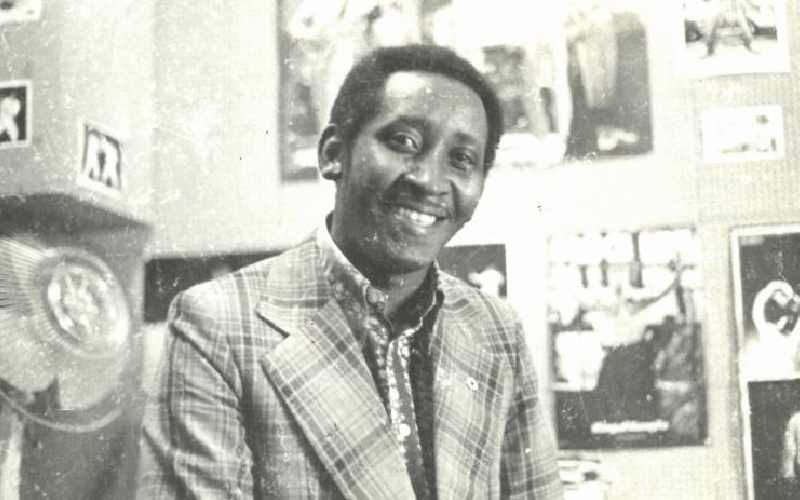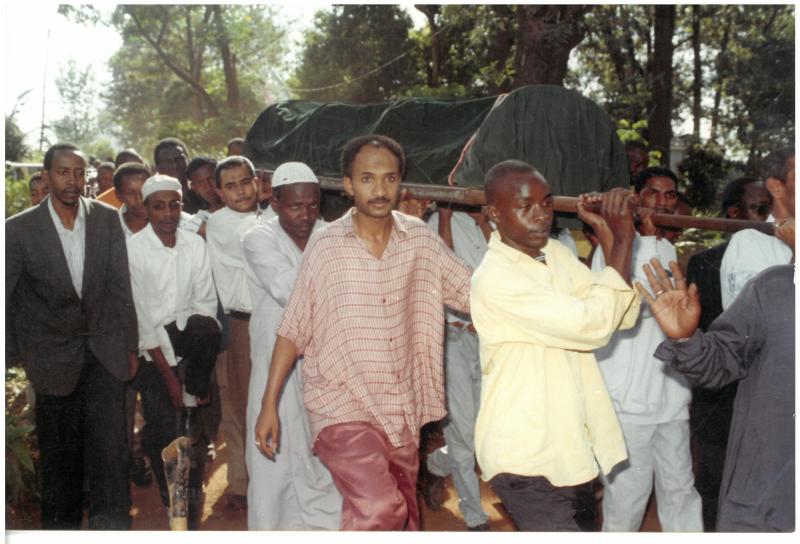
Musician Fadhili Williams.
Exactly 20 years since he died, his music lives on.
And sadly, the battle he fervently fought to have local music dominate the airwaves is still ongoing.
In the late 1970s, Fadhili Williams was part of a delegation that petitioned President Daniel Moi to protest the domination of the Kenyan music scene by foreign artistes.
“The President gave us an ear and promised that our grievances would be addressed. However, the relief was short-lived as the Voice of Kenya (VoK) soon relapsed to airing foreign beats at the expense of our home-grown talent,” he said in an interview.
Half a century later, that battle is still ongoing but his name has been cemented as one of the greatest Kenyan musicians to ever live.
If Fadhili had had his way, however, he might never have become a musician, and Malaika might never have been born.
He would have ended up joining the East African Railways as a supervisor and eventually become a locomotive driver, or a Criminal Investigations Department detective. He had applied for admission to the Kiganjo Training College for the latter.
Lucky for the music world, none of those plans came to fruition, thanks to his mother, Halima Wughanga. She opposed all his ideas but unwittingly planted one that he would run with and never let go for the rest of his life. She did this when she reluctantly bought him a gift in the 1950s when he was about 15, using money that she had been saving for him.
It was his first box guitar, an original Gallotone Classic model that cost Sh90 at the time.
His foray into music began in earnest there and then, and he dropped out of school in Form Three while at Shimo La Tewa School in 1954 to venture into music.
It had been in his destiny, running through his veins, as Fadhili’s father, Ramadhan Mwamburi, was a traditional musician. So were his siblings, Ali Harrison Mwataku, Esther John and Mumba Charo.
This story is detailed in a collection of stories on Kenyan musicians of old, dubbed, Kenyan Musicians, a Biography by the Permanent Presidential Music Commission, which details it from a number of newspaper interviews and articles. Fadhili was born in Taita Taveta County on November 11, 1938. His father died when he was only seven.
According to the book, a newspaper interview revealed that his mother moved to Nairobi a few months after his death and was employed as a nanny by a European family, but faced a lot of discrimination from the colonialists living in the area and they had to move to a friendlier neighbourhood.
Taxi Driver, a fan favourite that Fadhili composed, was based on his real-life experiences, on his taxi breaking down when he was on his way to see his first love, Rosemary.
She lived in Nakuru, and because of that Fadhili performed a lot more in the Rift Valley, just so that he could get to see her. She was the niece of one of his most ardent fans, Naff. They married in the 1960s and had six children, none of whom ventured into music.
He married again, this time to Anastasia Wairimu. They had one daughter. According to the book, he once said in an interview that he had children with three wives, married to two and was a grandfather to many. Fadhili was one of the first musicians in East Africa to use an electric guitar. He taught himself how to play the guitar, having had experience with traditional instruments and by watching other musicians do it.
Learning guitar
He was recruited by saxophonist Alexander Ayub to play in the Chem Chem Kids band, with which they played in weddings and parties. They also recorded with African Mercantile Company, and toured Uganda, which saw the birth of Kibingilisho, Bura Kwetu and Hakuna Kazi.
The recording and sales manager, Eric Blackart, saw the potential in Fadhili, which led him to record his first songs with East African Records in 1955.
Fadhili became Blackart’s assistant, helping vet people during auditions that were held on Tuesdays at the record label.
Fadhili, being the musical genius that he was, had a knack for intuitively knowing what would do well in the East African market, a trait that Blackart appreciated.
A trendsetter rather than a follower, Fadhili said in an interview that he was not influenced by any local or international artiste and that inspiration for his music sprouted “naturally – just like a plant in the wild.”
He had a successful run in the 1960s with the Equator Sound Band, of which renowned artiste Daudi Kabaka was also a member.
The band members went solo in the late 60s. Fadhili found great success as a solo artiste and in collaboration with other musicians over the years. He was able to live solely on his music, back when that was unheard of.
The authorship of one of his most world-famous songs, Malaika, is hotly disputed. Fadhili insists he composed it, but so do several other artistes.
He, however, earned from it despite this, saying in a 1998 interview that he had received royalties for the song from all over the world, almost amounting to Sh1.1 million.
His health started failing at the end of 2000 and by early 2001, he had succumbed to pneumonia. His legacy however only grew stronger and many musicians have pointed to him as one of their greatest inspirations. His music lives on.

 The Standard Group Plc is a multi-media organization with investments in media
platforms spanning newspaper print
operations, television, radio broadcasting, digital and online services. The
Standard Group is recognized as a
leading multi-media house in Kenya with a key influence in matters of national and
international interest.
The Standard Group Plc is a multi-media organization with investments in media
platforms spanning newspaper print
operations, television, radio broadcasting, digital and online services. The
Standard Group is recognized as a
leading multi-media house in Kenya with a key influence in matters of national and
international interest.









